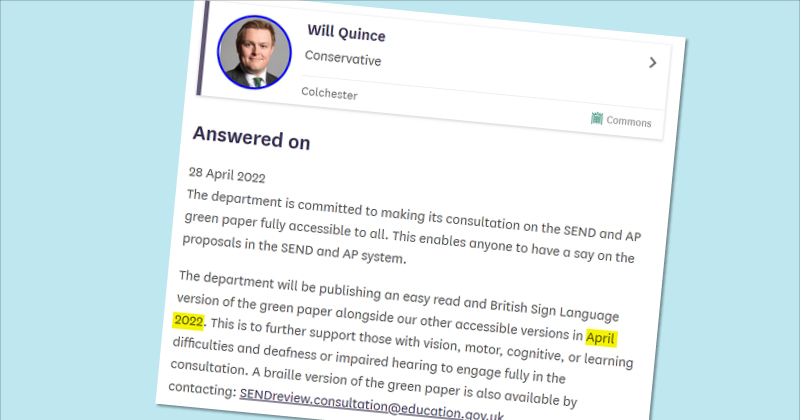Delays to accessible versions of the government’s SEND review has excluded some of the communities it seeks to support from the consultation process, almost six weeks after its launch.
The government has missed its own second deadline for publishing British Sign Language (BSL) and easy-read versions of the green paper.
When it was published on March 29, the Department for Education said the accessible versions would be ready “in early April”. A large print version is already available and a braille version on request.
Simon Knight, the head of Frank Wise special school in Oxfordshire, said the lack of accessible materials was “hugely concerning and is materially impacting on the ability of our students to have their voice heard”.
“It is tragically ironic that a consultation designed to address the dysfunctionality of the SEND system is, through the lack of suitable adapted materials, disadvantaging those very people the consultation is intended to improve outcomes for.”
In an answer to a written parliamentary question last Thursday, Will Quince, the children’s minister, said the additional accessible documents would be published “in April”.
But five days into May, the DfE had no update on their progress.
Quince apologised for the delay last week and said he was considering extending the consultation, due to end in July. He then promised an update in “the coming days”.
FE Week understands the documents are unlikely to be published until next week at the earliest.
As well as the lack of BSL and easy-read versions, Knight said there was no function for submitting non-narrative contribution “so those people who are not yet able to write do not need to have their thoughts interpreted and recorded by others”.
The consultation involves an online questionnaire, with no function to upload video.
“It would be extraordinarily unfair, if those in need of adapted materials had less time to participate in the consultation than those who do not need the content or process adapted,” Knight said.
A snap poll by Special Needs Jungle found 97 per cent of respondents backed extending the consultation because of the delays to accessibility.
Ian Noon, head of policy at the National Deaf Children’s Society, said the review could radically change deaf education, “yet many deaf children, young people and parents are being excluded from the chance to have their say”.
“Unless everyone affected is able to contribute, we risk emerging with a new SEND system that still doesn’t meet their needs. The deadline needs to be extended to give everyone a version that works for them and enough time for their voices to be heard.”
The delays to accessible versions follow substantial delays to the review itself.
The green paper was delayed three times after its 2019 launch. It was finally published on March 29, marking the opening of a 13-week consultation.
The proposed policies look to establish a “single national SEND and alternative provision system that sets clear standards for the provision that children and young people should expect to receive”.
Quince said last week he was sorry the publication of accessible versions had taken “longer than I had hoped”.
















Your thoughts